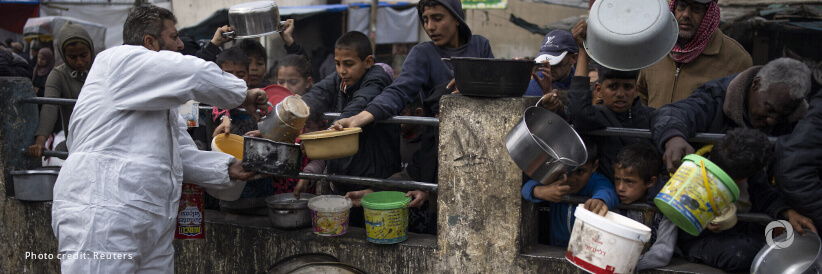A lack of food, water, and medicine means the entire population of Gaza, more than 2.2 million people, is experiencing crisis or above levels of food insecurity. At least one in four households, more than half a million people, are facing catastrophic or famine conditions – with that projection assessed as conservative. According to the UN, the last time food was delivered to northern Gaza was on January 23. People are surviving day by day with almost nothing to eat.
The ability of bakeries in Gaza to produce bread has been significantly reduced due to damage and shortages of electricity, fuel, water, and wheat. The agricultural sector, crucial given the reliance on fresh produce to fill the gap of commercial food imports, has been significantly damaged by ongoing hostilities and an intensified blockade. Gaza’s fishing industry is likewise paralyzed due to airstrikes and the fear of being targeted at sea. As a result, prices have surged with less food available, while at the same time, people’s financial ability to access food and other goods has declined due to conflict.
Mahmoud Shalabi, MAP’s Senior Programme Manager in northern Gaza, said: “There is nothing left in the market. People have been grinding animal feed and mixing it with the little flour available to make bread to feed their children. But the quality of this bread is unbelievably bad. Even animal feed is now beginning to run out in the market. Children have started going out on the streets with their plates, and empty pots and spoons banging on them and shouting they want to eat. If this situation continues, I’m afraid the worst will happen and more people will die of starvation. MAP is one of the only international charities working on the ground in the north, but the needs are more critical than ever right now. ”
Bob Kitchen, Vice President of Emergencies at IRC said: “As Israel’s total siege and indiscriminate bombardment surpass 140 days, food and clean water have become incredibly scarce, leaving hundreds of thousands on the brink of starvation. Diseases are rife and left unchecked will lead to tens of thousands of completely preventable deaths. And children who survive catastrophic levels of food insecurity will face ill health for the rest of their lives. The vast majority of aid convoys that have tried to access northern Gaza have been denied or struck by the Israeli military. With the entire population now at risk from a deadly combination of bombardment, disease and hunger we reiterate the desperate need for an immediate ceasefire across the entirety of Gaza and immediate humanitarian access via all possible routes to meet the totality of need. With the crisis about to enter its sixth month, the urgency to stop the fighting could not be any higher.”
Even before 7 October, Gaza was already in the midst of a humanitarian crisis due to Israel’s 17-year closure and blockade; which was deemed to constitute unlawful ‘collective punishment’ of the civilian population by the International Committee of the Red Cross. About 80% of the population already relied on humanitarian aid and 64% experienced food insecurity.
Article 33 of the Fourth Geneva Convention prohibits the collective punishment of civilians. As the occupying power in Gaza, Israel has the responsibility to ensure that the occupied population receives food and medical supplies. Further, the arbitrary denial of humanitarian access and depriving civilians of objects indispensable to their survival, including wilfully impeding relief supply and access, can constitute a violation of international humanitarian law.
In response to these grave concerns, the IRC and MAP are calling for the international community to:
- Work urgently to establish an immediate and permanent ceasefire in Gaza as the only sustainable way to protect civilian lives in Gaza.
- Urgently press Israel to meet its obligations under IHL and lift its total closure of Gaza, reopen its crossings, including the Karni and Erez crossings in the north, and allow the safe and unimpeded movement of humanitarian aid (including fuel, food, and medical supplies) and aid workers, medical personnel and sick and wounded people.
- Reactivate essential services in Gaza, including cross-border water supply pipelines and electricity, resume commercial goods traffic, and restart domestic production of fresh, nutritious foods. Increased humanitarian aid alone will not fend off famine, commercial trade should be re-established to pre-October levels.
- Demand that all parties comply with IHL, which includes the prohibition of the starvation of civilians as a method of warfare. The Rome Statute of the International Criminal Court provides that intentionally starving civilians by “depriving them of objects indispensable to their survival, including willfully impeding relief supplies” is a war crime.
- Uphold their Responsibility to Protect civilians against atrocity crimes before it is too late. There remains a very real risk of mass displacement of Palestinians from Gaza into Egypt and human rights experts warn of a “genocide in the making.”
- Massively upscale aid responses to the humanitarian crisis and allocate additional funding for immediate to long-term needs, aiming for the early restoration of agrifood systems, including agriculture, livestock, and fishing.

